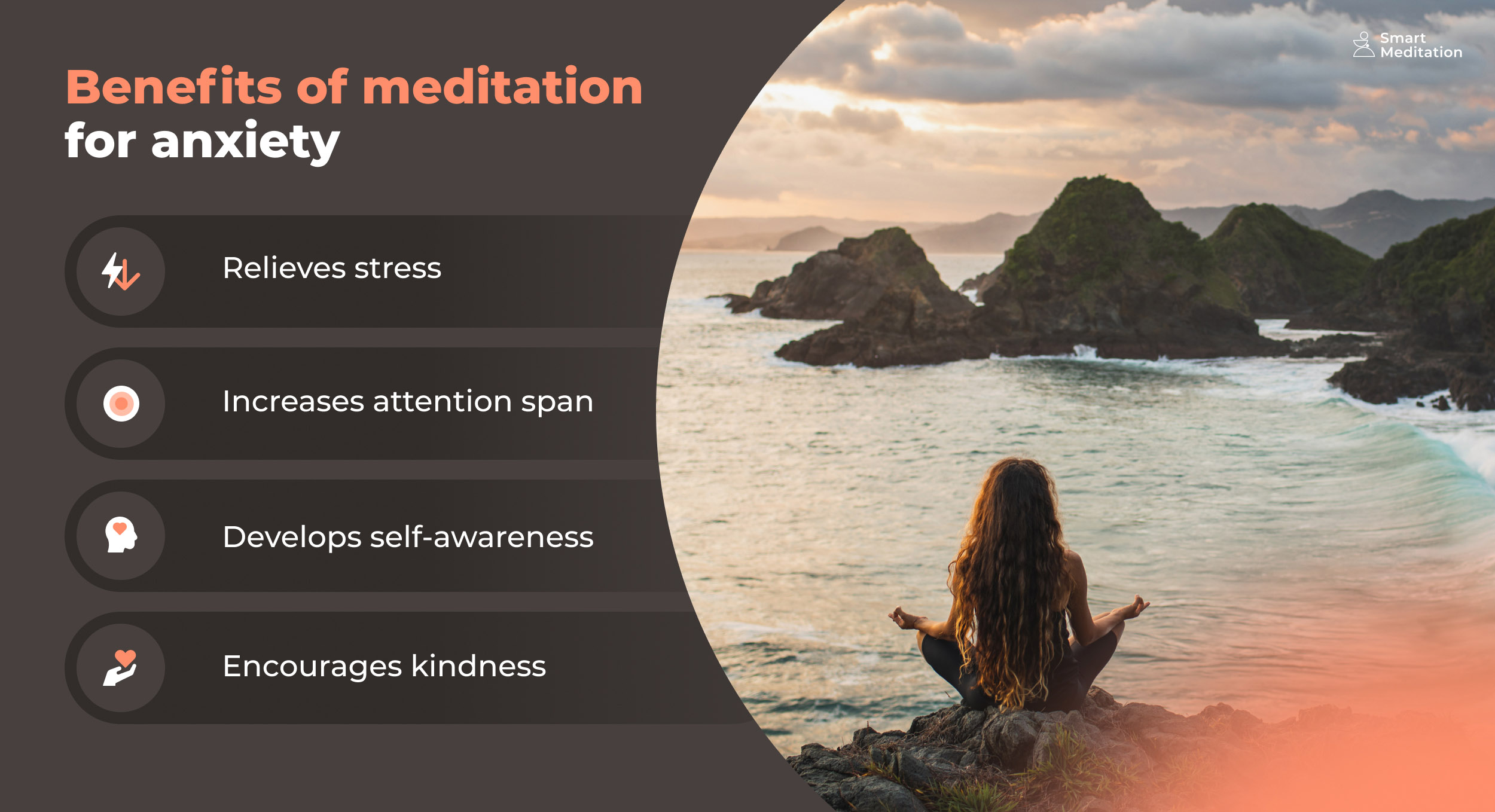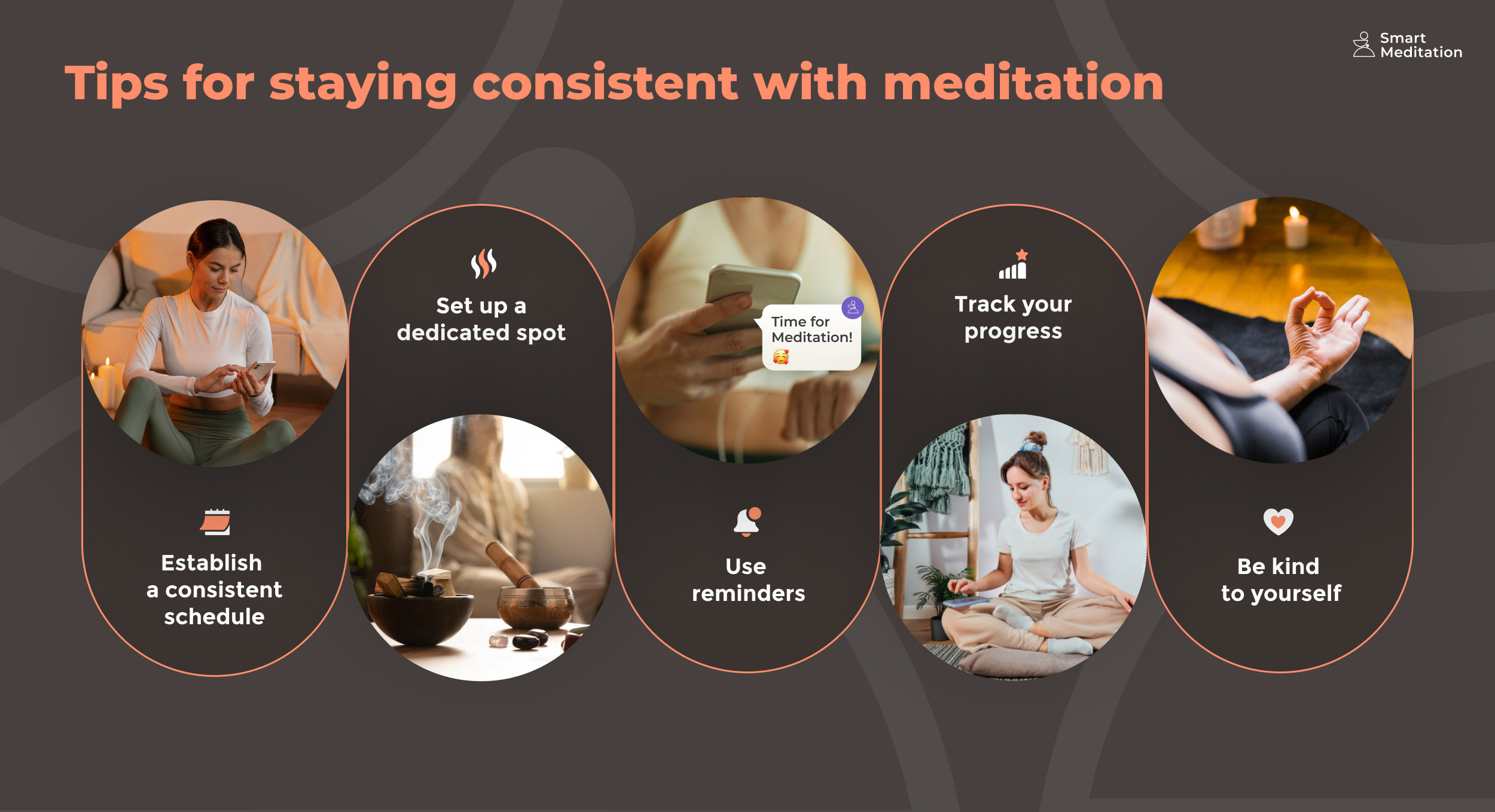
Techniques And Tips For Practicing Meditation For Anxiety
According to the National Alliance on Mental Illness, an estimated 40 million people (or every 9th person) in the U.S. suffer from systematic anxiety.
Anxiety is a cognitive state linked to an inability to control emotions and is a natural reaction of our body to stress. And while every person can experience anxiety from time to time, for some it becomes a major problem, negatively affecting their mood, productivity, and even physical well-being.
When trying to counteract the effects of anxiety and to reduce it as much as possible, a practice like meditation shouldn’t be overlooked. When we meditate, we lower our blood pressure, heart rate, and oxygen consumption, which help us calm down. On top of that, research has shown that regular meditation not only makes us feel calmer but also changes the neuronal connections in our brains, which enhances our capacity to control our emotions in general.
In this article we’re going to show you how to meditate for anxiety – we’ll describe common meditation techniques and benefits, plus we’ll give you tips to stay consistent and overcome possible challenges.
Benefits Of Meditation For Anxiety
Meditation can directly and indirectly reduce anxiety and improve your emotional well-being in a multitude of ways:
Relieves Stress
One of the most popular reasons individuals practice meditation is to reduce stress, which is the core reason for anxiety. And a number of scientific studies proves that it is a viable solution.
For instance, in an eight-week research, the mindfulness meditation technique has decreased the amount of the “stress hormone”, cortisol, and mitigated cortisol-induced inflammatory responses of our body such as increased blood pressure and heart rate.
Additionally, other studies have indicated that meditation for anxiety may curb symptoms of such stress-related illnesses as fibromyalgia, irritable bowel syndrome and PTSD.
Increases Attention Span
Meditating with focused concentration is like lifting weights for your attention span, improving your mental strength, stamina and resistance to anxiety-inducing behaviors such as restlessness.
According to this study, people who listened to a meditation tape while carrying out a task performed the activity with greater precision and concentration than those in the control group. Another study points out that 8 weeks of daily, brief meditation sessions have helped participants improve their attention span by 13 minutes on average.
Develops Self-Awareness
Meditation may also help you understand yourself better, encouraging you to become the best version of yourself and experience less anxiety because of that.
For instance, self-inquiry meditation specifically attempts to assist you in becoming more aware of who you are and how you interact with people around you. Other techniques train you to spot potentially damaging or self-defeating beliefs. The idea is that as you become more conscious of your thinking patterns, you become more capable of reshaping them into more positive ones.
Encourages Kindness
Specific meditation techniques may help you feel and act more positively toward yourself and others, reducing stress and anxiety.
The practice of loving-kindness meditation, or metta, begins with cultivating nice thoughts and sentiments toward oneself. Through repetition, people learn to extend this forgiveness and kindness to others as well, starting with close friends before moving on to acquaintances and even enemies.
One study involving 50 college students found that metta meditation practice increased their levels of empathy and the quality of their social interactions after four weeks.

Getting Started With Meditation
The amount of meditation techniques, practices and tips may seem quite overwhelming when you’re just starting out. You may even learn how to meditate in bed for anxiety, but in this section we’re going to stick to the basics and give you the easiest and the most widely accepted methods of effective meditation:
Guided Meditation
If you want to know how to meditate for anxiety for beginners, guided meditation is arguably the best option. Guided meditation is basically any meditation practice that is helped by a third party. To start with, you can try online guidance – audio tracks, podcasts, YouTube videos are all good choices. Alternatively, you can go for an in-person meditative experience and participate in guided meditation classes like yoga.
Mindfulness Meditation
Mindfulness meditation is a technique that is centered around your mind focusing on the present moment. The practitioner usually takes a comfortable sitting position and concentrates on a specific anchor, such as the sensations of the breath, physical sensations, or sounds. The aim is to observe the present moment without any judgment or attachment, while your thoughts, feelings, and bodily sensations simply come and go.
Anxiety Breathing Meditation
Deep breathing techniques are also known to help lessen the signs of stress and anxiety. Take slow, deep breaths and exhale even slower while seated quietly and comfortably to practice your breath awareness and control. You may experiment with your breathing patterns – you can choose to stick to your natural rhythm or you can make it slower for a more focused experience.
Mantra-Focused Meditation
Mantra meditation is a type of meditation in which you repeat a mantra (a word, phrase, or sound) to concentrate your mind and achieve inner peace and clarity. Repetition of the mantra acts as a focal point which helps divert attention from unnecessary concerns. The mantra used can vary depending on one’s preferences or the particular tradition they adhere to. Some of the most common ones are “Om”, “Om Namah Shivaya”, and “Sat Nam.”
Body Scan Meditation
Body scan meditation is about focusing on each of your body parts and is frequently used to calm your body and help you become more aware of your surroundings. You can start off by sitting or standing comfortably while listening to soft instrumental music. Then, tell your mind to concentrate first on your head, then move the focus to your neck, then shoulders and so on.
Tips For Staying Consistent With Meditation
As with any healthy habit, sometimes it’s not very easy to instill; and even hard to stay consistent once you do. Here are some tips that can help you with that:
Establish a consistent schedule: When you commit a specific time period to a specific activity, it massively helps to get yourself into a good rhythm. Remember that’s not always about the frequency – consistency is far more important. So it’s totally fine not to have your meditation sessions too often as long as they’re regular.
Set up a dedicated spot: Similarly to having a schedule, creating a special place for yourself to meditate is very important. Find a spot that feels right for you – harmonious, calm and distraction-free.
Use reminders: To help you remember to practice, set reminders or alarms on your phone or use meditation apps that can send timed notifications. These could be especially beneficial, when you’re just starting out or having a very busy day or week.
Track your progress: Keep a meditation notebook or use an app that tracks your sessions to monitor your progress. It always adds to your motivation seeing your development and the beneficial effects it has on your mental and emotional health.
Be kind to yourself: Sometimes you just have one of those days when you can’t focus or get yourself to meditate. In these times it’s important to avoid self-criticism and accept that it’s a normal part of the process. Pressuring yourself to meditate when you don’t feel like it can make meditation feel like a chore.

Common Challenges During Meditation And How To Overcome Them
It’s very common to experience at least one or two hurdles when trying to bring meditation into your life. Moreover, it is completely normal – these hurdles can be easily lifted and you’ll only grow as a person doing that. Here are some of the most common challenges people face:
Lack of time: Finding time for meditation might be difficult due to hectic schedules and conflicting agendas. However, the great thing about meditation is that it doesn’t have to take up a lot of time. If you’re having a busy day, even a few minutes of focused breathing a couple of times can do a world of good.
Lack of motivation: It’s common to struggle with the motivation for meditation. When you do, make sure to remind yourself of why you started meditating in the first place. Reaffirm your purpose for practicing meditation as well as the benefits you seek to achieve. Reading books, listening to mindfulness podcasts, or attending a group session are also good ways of reigniting your passion for meditation.
Wandering thoughts: During meditation, it’s normal for the mind to stray and for thoughts to become seemingly uncontrollable. When this happens, softly regroup and put your concentration back on your meditation’s focal point, for instance, your breathing or a specific mantra. Also remain patient and don’t judge yourself when you do wander slightly.
Perfectionism: Sometimes meditation sessions can leave you frustrated because of how “sloppy” or “chaotic” they felt. Remember, there is no such thing as perfect meditation. Give up the notion that your mind must remain calm and uncluttered 100% of the time. Accept the ups and downs of your meditation practice because they are a necessary part of the learning process.
Conclusion
Meditation is extremely beneficial for reducing anxiety. It does so by relieving stress, improving your self-awareness, fostering kindness and increasing your attention span, among other things. If you don’t yet know how to meditate for anxiety and depression, you’re free to experiment with different techniques such as body scans, mantras or even simple mindfulness meditations. On top of that, when fighting anxiety, guided meditation is also a great choice.
To stay consistent with meditation, set up a schedule, dedicate a special place, and record your progress. And don’t be discouraged by lack of time or motivation – having shorter sessions and searching for inspiration from books, podcasts and other people will help you to stay on track and forget about anxiety being a problem in your life.






